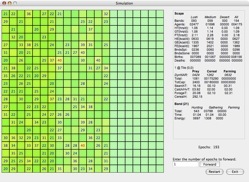Themes
Agents display complex forms of intelligent interaction, such as negotiation and cooperation. Especially important in such interactions is higher-order social cognition. This is the ability to model mental states of other agents, including those that concern one's own mental state, third parties, and group mental states.
Nowadays, intelligent interaction between people and computer systems is becoming vital for designing mixed multi-agent teams. However, research has focused mostly on idealized software agents with perfect logical reasoning powers. People, in contrast, have cognitive limitations when reasoning about others. Therefore, current formal models of intelligent interaction cannot cope with mixed multi-agent environments.
The Multi-Agent Systems Group aims to construct new theory and computational models of higher-order social cognition to enhance the development of intelligent interaction between people and computer systems by supporting their abilities to reason about one another.
Research


















Key Publications
B. Dunin-Keplicz and R. Verbrugge, Awareness as a vital ingredient of teamwork, in: P. Stone and G. Weiss (eds.), Proceedings of the Fifth International Joint Conference on Autonomous Agents and Multi-Agent Systems (AAMAS'06), 2006, pp. 1017-1024. Dunin-Keplicz&Verbrugge2006.pdf.
R. Verbrugge and L. Mol, Learning to apply theory of mind, Journal of Logic, Language and Information, special issue on formal models for real people, to appear. Verbrugge&Mol2008.pdf.
L. Flobbe, R. Verbrugge, P. Hendriks and I. Kramer, Children's application of theory of mind in reasoning and language, Journal of Logic Language and Information, special issue on formal models for real people, to appear. FlobbeVerbrugge&al2008.pdf.
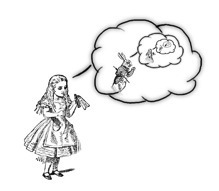
Today the study of argumentation, which goes back at least to antiquity, has become a thoroughly multidisciplinary field, where insights developed in artificial intelligence, cognitive psychology, logic and application domains such as medicine and law, meet. The argumentation research in our Multi-Agent Systems research group focuses on defeasible argumentation, legal reasoning and argumentation support software.
We take a cognitive systems perspective, where theory, modeling and implementation go side by side. For instance, we build computer models of argumentation in order to increase knowledge about natural argumentation, and study the design of argumentation support software both in relation to actual task performance and in relation to formal logical models.
Higher-Order Social Cognition
Argumentation
Key Publications
B. Verheij, Argumentation support software: Boxes-and-arrows and beyond, Law Probability and Risk, 6, 2007, pp. 187-208. Manuscript: Verheij2007.pdf.
D. Hitchcock and B. Verheij, Arguing on the Toulmin Model. New Essays in Argument Analysis and Evaluation, Argumentation Library, Vol. 10, Spring, Dordrecht.
B. Verheij, Artificial argument assistants for defeasible argumentation, Artificial Intelligence, (150):1-2, 2003, pp. 291-324. Manuscript: Verheij2003.pdf. Software: Link.
Cooperative Problem Solving
In cooperative problem solving, agents choose to work together to solve problems, in order to advance their own goals and those of the team as a whole.
Over the last twelve years, our Multi-Agent Systems Group has cooperated with the multi-agent systems group in Warsaw to create a complete logical framework for teamwork. First, we have developed a theory of static aspects of teamwork in multi-agent systems, formalizing the attitudes needed for cooperative problem solving: From individual intentions and social commitments up to collective intentions and commitments.
Next, a dynamic theory provided a generic method applicable when a team plan fails. Also, the dialogues used in teamwork, such as persuasion, have been characterized, and the complexity of our theoryTeamLog has been investigated. Nowadays, work is under way on a book 'Teamwork in Multi-Agent Systems', to appear with John Wiley and Sons.
Key Publications
F. Dignum, B. Dunin-Keplicz, and R. Verbrugge, Creating collective intention through dialogue, Logic Journal of the IGPL, 9, 2001, pp. 289-303. Dunin-Keplicz&Verbrugge2006.pdf.
B. Dunin-Keplicz and R. Verbrugge, A tuning machine for cooperative problem solving, Fundamentae Informatica, 63, 2004, pp. 283-307. Dunin-Keplicz&Verbrugge2004.pdf
M. Dziubinski, R. Verbrugge and B. Dunin-Keplicz, Complexity issues in multi-agent logics, Fundamentae Informatica, 74, 2007, 239-262. Dziubinski&al2006.pdf
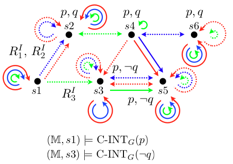
Techniques
Logic
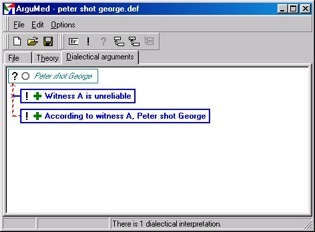
The Multi-Agent Systems Group applies logic in both well-known and novel ways. Logic provides a tested method to specify desired behavior of computational multi-agent systems in so-called belief-desire-intention (BDI) systems. We also use epistemic logics to design communication protocols and non-monotic logics to describe legal reasoning.
In our recent work, we aim to design cognitively plausible logics for higher-order social cognition and to use logical representations as evolvable forms in agent-based simulations of cognitive evolution.
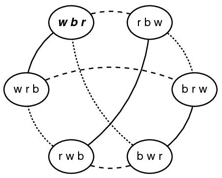
Key Publications
H. van Ditmarsch, J. Ruan and R.Verbrugge, Sum and product in dynamic epistemic logic, Journal of Logic and Computation, to appear. Ditmarsch&al2008.pdf.
B. Kooi, G. Renardel de Lavalette and R. Verbrugge, Hybrid logics with infinitary proof systems, Journal of Logic and Computation, 16, 2006, pp. 161-175. Kooi&al2006.pdf.
B. Verheij, DefLog: On the logical interpretation of prima facie justified assumptions, Journal of Logic and Computation, 13, 2003, 319-246. Verheij2003a.pdf.
R. Verbrugge, Provability logic, refereed lemma commissioned by: E. Zalta (Ed.), The Stanford Encyclopedia of Philosophy, Summer 2003 Edition. Link.
Agent-based Modeling
A typical agent-based model consists of an artificial world and its artificial inhabitants, whose behavior is guided by rules. By explicitly simulating individual agents, one can study the cumulative effects of local interactions, as well as the outcomes of evolutionary processes.
In the Multi-Agent Systems Group, we use agent-based modeling both to study specific real-world systems, as well as to investigate broader theoretical questions. In all cases, we strive to build agent-based models that are relevant to existing empirical questions.
Key Publications
I. Slingerland, M. Mulder, E. van der Vaart and R. Verbrugge, A multi-agent systems approach to gossip and the evolution of language, to appear in: N.A. Taatgen & H. van Rijn, Proceedings of the 31st Annual Meeting of the Cognitive Science Society (CogSci'09), 2009. Slingerland&al2009.pdf.
E. van der Vaart, C. Hemelrijk and R. Verbrugge, Learning where (not) to cache: A cognitive model for corvids, to appear in: N.A. Taatgen & H. van Rijn, Proceedings of the 31st Annual Meeting of the Cognitive Science Society (CogSci'09), 2009. vanderVaart&al2009.pdf.
E. van der Vaart and R. Verbrugge, Agent-based models: A proposal and prototype, in: L. Padgham and D. Parkes, Proceedings of the Seventh International Joint Conference on Autonomous Agents and Multi-Agent Systems (AAMAS'08), 2008, pp. 1145-1152. vanderVaart&Verbrugge2008.pdf.
E. van der Vaart, B. de Boer, A. Hankel and B. Verheij, Agents adopting agriculture: Modeling the agricultural transition, in: S. Nolfi, G. Baldassarre, R. Calabretta, J. Hallam, D. Marocco, J.A Meyer and D. Parisi, From Animals to Animats 9: Proceedings of the Ninth International Conference on the Simulation of Adaptive Behavior (SAB'06), 2006, pp. 750-761. vanderVaart&al2006.pdf.
